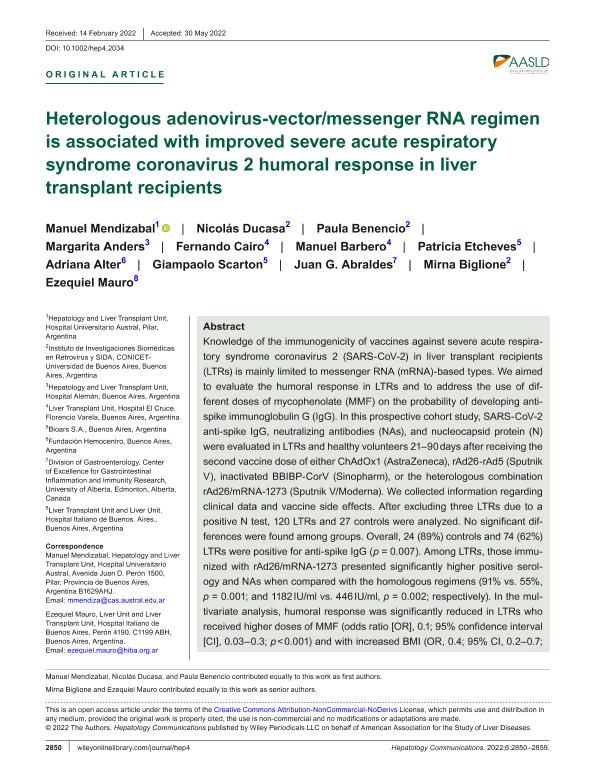Artículo
Heterologous adenovirus-vector/messenger RNA regimen is associated with improved severe acute respiratory syndrome coronavirus 2 humoral response in liver transplant recipients
Mendizabal, Manuel; Ducasa, Nicolás; Benencio, Paula ; Anders, Margarita; Cairo, Fernando; Barbero, Manuel; Etcheves, Patricia; Alter, Adriana; Scarton, Giampaolo; Abraldes, Juan G.; Biglione, Mirna Marcela
; Anders, Margarita; Cairo, Fernando; Barbero, Manuel; Etcheves, Patricia; Alter, Adriana; Scarton, Giampaolo; Abraldes, Juan G.; Biglione, Mirna Marcela ; Mauro, Ezequiel
; Mauro, Ezequiel
 ; Anders, Margarita; Cairo, Fernando; Barbero, Manuel; Etcheves, Patricia; Alter, Adriana; Scarton, Giampaolo; Abraldes, Juan G.; Biglione, Mirna Marcela
; Anders, Margarita; Cairo, Fernando; Barbero, Manuel; Etcheves, Patricia; Alter, Adriana; Scarton, Giampaolo; Abraldes, Juan G.; Biglione, Mirna Marcela ; Mauro, Ezequiel
; Mauro, Ezequiel
Fecha de publicación:
10/2022
Editorial:
John Wiley & Sons
Revista:
Hepatology Communications
ISSN:
2471-254X
Idioma:
Inglés
Tipo de recurso:
Artículo publicado
Clasificación temática:
Resumen
Knowledge of the immunogenicity of vaccines against severe acute respiratory syndrome coronavirus 2 (SARS-CoV-2) in liver transplant recipients (LTRs) is mainly limited to messenger RNA (mRNA)-based types. We aimed to evaluate the humoral response in LTRs and to address the use of different doses of mycophenolate (MMF) on the probability of developing anti-spike immunoglobulin G (IgG). In this prospective cohort study, SARS-CoV-2 anti-spike IgG, neutralizing antibodies (NAs), and nucleocapsid protein (N) were evaluated in LTRs and healthy volunteers 21–90 days after receiving the second vaccine dose of either ChAdOx1 (AstraZeneca), rAd26-rAd5 (Sputnik V), inactivated BBIBP-CorV (Sinopharm), or the heterologous combination rAd26/mRNA-1273 (Sputnik V/Moderna). We collected information regarding clinical data and vaccine side effects. After excluding three LTRs due to a positive N test, 120 LTRs and 27 controls were analyzed. No significant differences were found among groups. Overall, 24 (89%) controls and 74 (62%) LTRs were positive for anti-spike IgG (p = 0.007). Among LTRs, those immunized with rAd26/mRNA-1273 presented significantly higher positive serology and NAs when compared with the homologous regimens (91% vs. 55%, p = 0.001; and 1182 IU/ml vs. 446 IU/ml, p = 0.002; respectively). In the multivariate analysis, humoral response was significantly reduced in LTRs who received higher doses of MMF (odds ratio [OR], 0.1; 95% confidence interval [CI], 0.03–0.3; p < 0.001) and with increased BMI (OR, 0.4; 95% CI, 0.2–0.7; p = 0.005); and it was significantly higher in those immunized with rAd26/mRNA-1273 (OR, 13.1; 95% CI, 2.3–72.9; p = 0.003). In LTRs anti-spike IgG concentrations showed a very good correlation with NA titers (R2 = 0.949; 95% CI, 0.919–0.967; p < 0.001). No serious adverse events were reported in either group. Conclusion: In LTRs, rAd26/mRNA-1273 was independently associated with higher antibody response. Future studies are necessary to evaluate whether combining different vaccine platforms and MMF reduction may lead to a better booster response.
Palabras clave:
SARS CoV-2
,
VACCINES
,
LIVER TRANSPLANT
,
ARGENTINA
,
COVID-19
Archivos asociados
Licencia
Identificadores
Colecciones
Articulos(INBIRS)
Articulos de INSTITUTO DE INVESTIGACIONES BIOMEDICAS EN RETROVIRUS Y SIDA
Articulos de INSTITUTO DE INVESTIGACIONES BIOMEDICAS EN RETROVIRUS Y SIDA
Citación
Mendizabal, Manuel; Ducasa, Nicolás; Benencio, Paula; Anders, Margarita; Cairo, Fernando; et al.; Heterologous adenovirus-vector/messenger RNA regimen is associated with improved severe acute respiratory syndrome coronavirus 2 humoral response in liver transplant recipients; John Wiley & Sons; Hepatology Communications; 6; 10; 10-2022; 2850-2859
Compartir
Altmétricas



